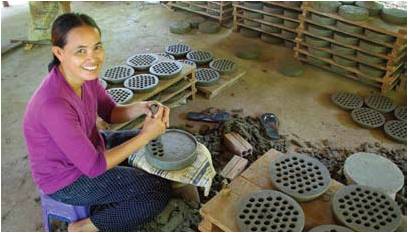News
 An event at the World Bank on February 14, 2012 brought together specialists from two areas critical to development who normally do not get many chances to compare experiences: rural sanitation and household energy. Participants shared challenges and opened a discussion on how to reach the “bottom of the pyramid”—the poorest groups in society—with improved social and infrastructure services.
An event at the World Bank on February 14, 2012 brought together specialists from two areas critical to development who normally do not get many chances to compare experiences: rural sanitation and household energy. Participants shared challenges and opened a discussion on how to reach the “bottom of the pyramid”—the poorest groups in society—with improved social and infrastructure services.
Jacqueline Devine from the World Bank’s Water and Sanitation Program pointed out similarities between improved sanitation and clean cook stoves, saying that scaling up rural sanitation required four stages: strengthening an enabling environment, generating demand, strengthening supply, and learning and knowledge. Generating demand is of particular interest to household energy practitioners as cook stoves programs are gaining additional momentum with the Global Alliance for Clean Cookstoves and the UN Sustainable Energy for All Initiative. She pointed out the need in some countries for market segmentation, noting that peri-urban poor and the rural extreme poor will need different financing strategies to address their access needs.
Jie Tang from the World Bank’s East Asia and Pacific Energy unit introduced a short video on the Cambodia Neang Kongery Stove Program showing a sustainable business model to scale up the production and distribution of cookstoves in a poor community. The video documents the importance of taking the lives of men and women in the community into account during project planning and implementation. As the video shows, women were both the beneficiaries of improved stoves, but were also critical participants in the process for design to producing the stoves in the convenience of their homes, allowing them the flexibility of caring for other household needs.
Across both presentations and all the country examples, a common theme emerged—no matter the product, whether it is toilets or cook stoves—social and emotional drivers are often more important than rational benefits. Just because a community is poor does not mean they do not have preferences—it is critical to consider the needs, wants and reality at the base of the pyramid when designing programs.
Links:
